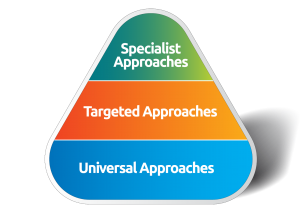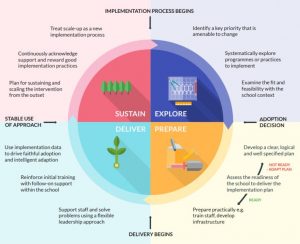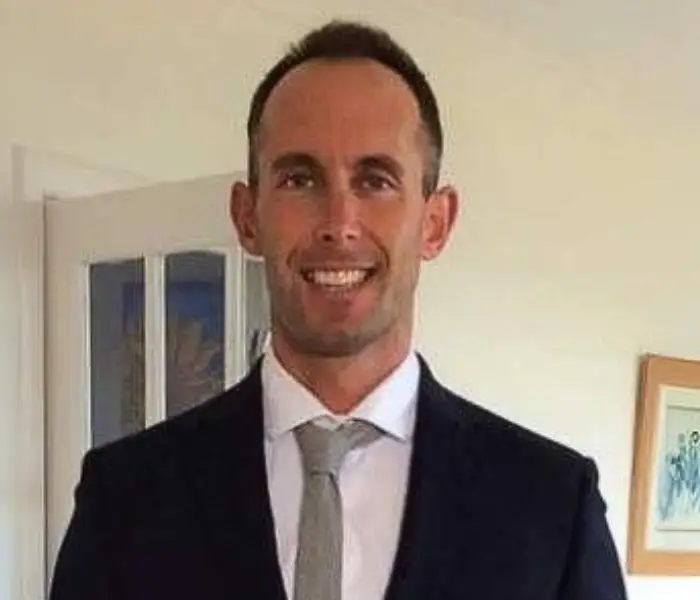Andy Kingdon – CCET Intensive
Andy Kingdon recently took part in our Certificate of Competence in Educational Testing intensive January 2021 event. These events are usually held in various locations across 3 intensive learning days. Under the current circumstances, they are taking place intensively online via Campus Live.
Andy works as a Learning Support Teacher and SpLD literacy intervention teacher for an independent school in Devon. In regard to SEND he has special interests in Dyslexia and behaviour. Read on to see what Andy had to say about his time studying on our CCET Intensive course and his plans for the future.
What made you choose the Real Training course over other options?
I had colleagues at work who had also completed this course with Real Training. Thanks to their suggestion that this would be a good fit for what I needed, I went ahead and booked with Real Training as well.
What was your experience of learning with Real Training?
Firstly, the course was well run during the three-day intensive online learning. All three days were very intense but the delivery was brilliant and there was plenty of time built in to talk to other participants on the course and reflect upon the learning. Completing the three-day intensive course and completing the work set in the evenings helped to cement my understanding. Secondly, after the three-day part of the course, the support I was given from my tutor was brilliant. He replied to my emails very quickly and often marked my work within 24 hours, providing insightful feedback.
How has the course helped make an impact at school?
Thanks to my completion of the CCET Intensive course, I am now able to test all the pupils I teach. I am now actively doing this and assisting in making helpful judgements on what support they require.
How has the course helped develop you as an educational professional and what do you hope to achieve with the new knowledge/skills in the future?
Since completing CCET, I am now looking to continue my learning journey by enrolling on the AAC course. After this, I would like to look into becoming an Accredited Level 5 Dyscalculia and Maths Learning Difficulties Teacher.
Monique Van Zyl – iSENCO
Monique Van Zyl currently teaches English Literature and Studio Art at an IB International School in Beijing, China.
She has a keen interest in SEND but more specifically in Social Emotional Mental Health (SEMH). Completing her International Award for SEN Coordination qualification with us in 2021, Monique has now gone on to start our SEMH module as part of our MEd SEND programme.
Monique talks a little more about her learning experience with Real Training and why she has chosen to study further with us below.
What made you choose the Real Training course(s) over other options?
Real Training was recommended by a friend who had completed the course a few years ago. This program suited me because of the variety of options available to make up the master’s degree. The timing of the course was also very flexible and I appreciated the option of finishing modules sooner than the scheduled submission dates.
What was your experience of learning with Real Training?
The support during the iSENCO module was incredible. Feedback happened much faster than I expected, and genuine efforts were made throughout to assist me during the tasks. As my teaching setting does not have a SEND department, I started this course with very little knowledge or experience in this area, but my tutor carefully guided me through my initial insecurities. The platform is intuitive and easy to use, which was quite different from what I had experienced before when studying with online universities.
How has the course helped make an impact at school?
The insight provided by the iSENCO course has been invaluable, not just for my own practice, but for my entire school setting. I have been able to share new ideas and practices that have had a direct positive impact on our learners. They have also been able to guide teaching staff to implement these strategies in their own classrooms. Although we are still a long way off from implementing the most up-to-date SEND policies in our school, with the help of Real Training’s iSENCO course, I have been able to persuade management to start improvements.
How has the course(s) helped develop you as an educational professional and what do you hope to achieve with the new knowledge/skills in the future?
As an educator, I have been able to grow in my understanding of SEND structures and the accompanying whole-school implementations thereof. Before the iSENCO course, I was unaware of the intricacies involved in running a SEND department, and I have a much more in-depth knowledge and understanding regarding the lack thereof in my setting. I am now, instead of finding fault and assigning blame to various departments, able to assist department heads in finding ways to support their pupils, usually by finding alternate and creative solutions to do so.
I believe as a future iSENCO, the creative problem-solving skills gained through this course will help me assist and support both teachers and students better than any other program I previously considered. I look forward to stepping into a new career with Real Training as my guide.
Stephen Oswald – CPT3A
When Stephen Oswald moved to the UK he sought ways of expanding his experience in primary and secondary teaching. He found working with young people post 16 was a refreshing challenge.
He is currently a Specialist Assessor and SENCO at a large multicultural sixth form college in south-east London and Kent, and has recently completed the Certificate in Psychometric Testing, Assessment, and Access Arrangements.
What made you choose Real Training over other options?
When the college where I worked was taken over by a large collegiate early in 2013, more specialist assessors were needed as soon as possible. My senior colleague recommended Real Training for their efficiency, adding that I could qualify within a year.
What was your experience of learning with Real Training?
My colleague’s advice was sound. As soon as funds were available, I applied for CPT3A and finished this course ahead of schedule. Not long after qualifying, JCQ stipulated that the assessor’s qualification must be at level 7 and should reflect 100 hours of practical input. It was really helpful when Real Training re-issued my certificate in 2015 – with a supporting letter- to confirm that these requirements indeed have been met.
Throughout all courses with Real Training, I really benefited from the prompt formative feedback on submitted work. The online programmes are easy to navigate, and progress can be self-monitored instantly. It is impossible to miss a component, which actually did happen when I followed another course with a different provider – luckily, they gave me an extension…
How has the course helped make an impact at school?
My CPT3A course has helped me to appreciate that a substantial number of young people in every cohort need an extra depth of understanding and guidance. For that reason, I continued studying ASD and Dyslexia at the Post-Graduate Diploma level. This extension has helped greatly in finding ways of making ILPs and EHCPs work as secondary school pupils transfer through to sixth form. Annually, I take care of around 45 EHCP reviews across sites.
How has the course helped develop you as an educational professional and what do you hope to achieve with the new knowledge/skills in the future?
Real Training has better equipped me for my role as a Specialist Assessor and SENCO. Per year I have meetings and administer assessments with over 300 students across sites. It is very rewarding playing a small part in the students’ progress and assisting them in overcoming obstacles – always realising that ultimately it is their endeavour that sees them through in triumph.
Real Training has also prepared me to lead insets and training – for new teaching staff in particular. About meeting the needs of students with disabilities, learning difficulties and EAL. I have also been able to specialise in writing and illustrating training material for in-house use, aiming for the greatest clarity possible, through brevity, logic and humour.
At present, most work in Additional Learning Support is done via video-link. This has for me only been possible thanks to a solid basis of practice-based training and application of skills in real-life pre-Covid, and I look forward to a safe opening up of society and seeing our students back again.
The implementation of evidence-based SEMH interventions by teaching assistants
In a recent webinar for the Federation of British Schools in Asia (FOBISIA), Real Training Educational Psychologist Dr. Hannah Fairall discussed the implementation of evidence-based Social, Emotional & Mental Health (SEMH) interventions by Teaching Assistants (TAs). The topics covered included how the rise of teaching assistants can be leveraged to deliver crucial support to pupils with SEMH needs, how universal targeted and specialist evidence-based approaches can be used to deliver targeted interventions in the classroom on a 1:1 or small group basis, and the importance of effective implementation.
With the current pandemic, SEMH needs amongst school-aged children have become a central concern, addressing issues such as anxiety, depression, isolation, and grief management. Even prior to this, 1 in 10 pupils aged 5-16 suffer from a clinically significant mental health illness, and 1 in 7 have less severe problems that nonetheless interfere with their development and learning.
The rise of Teaching Assistants, and how to maximise their impact
The rise of Teaching Assistants in classrooms has been meteoric since 2000, with 35% of staff in primary schools and 15% of staff in secondary schools being TAs in 2015. This rise, coupled with the governmental efforts to raise educational standards and reduce teacher workloads, leads naturally to the question of how to effectively leverage this workforce, particularly in the field of SEN. Blatchford et al (2015) found lower levels of progress amongst pupils receiving most support from TAs. The proposed explanation was that TA resource was not being effectively utilised, possibly because TAs were used as an alternative to ‘teacher time’, and that those with greatest need were often taught by the least qualified to do so.
Interventions for supporting SEMH and the three-tiered structure
According to Carroll & Hurry (2018), there are three ‘tiers’ of approach when it comes to SEMH support within schools:

- Universal – whole-school initiatives which foster an environment of emotional wellbeing; for all students
- Targeted – small group or one-to-one support inside or outside of the classroom; for some students
- Specialist – intensive one-to-one which can involve contact with professionals from different agencies; for few students
Universal Interventions
Universal initiatives are those such as the PACE model, developed by Dr Daniel Hughes. This aims to enable staff to engage with children who have experienced neglect, abuse and trauma. Although there is little research of its use in isolation, there is considerable practice-based evidence from parents, staff and professionals of its use as part of a wider intervention.
The PACE model contains four elements:

Another possible universal-level intervention is mindfulness. The aim of this is to learn to be aware of thoughts and bodily sensations in order to be able to better cope with daily emotions and challenges. This has shown promising impacts on wellbeing, aspects of cognition, physical health, and academic grades.
Targeted Interventions
Targeted, one-on-one or small group interventions, delivered by TAs, have the potential to deliver tangible positive effects on the mental health of children in the classroom.
Six evidence-based interventions are discussed:
Emotional Literacy Support Assistant Training (ELSA)
This training enables TAs to deliver 1:1 or small group interventions in several areas of need, including managing emotions, social skills, and bereavement. This covers all age groups.
The Homunculi Approach
This flexible cognitive behavioural therapy is a 10-week programme and seeks to identify emotions and social situations to build social and emotional resilience. This can be especially appropriate for children who have high-functioning ASD.
LEGO-based Therapy
There, children work collaboratively to create models. This approach works well with ASD or other social communication difficulties at primary and secondary levels.
Nurture Groups
Supported by two members of staff, groups of between 6 and 12 spend part of the school day in a nurture group setting. This has been seen to have a positive impact on emotional, behaviour, and learning.
Circle of friends
A support network developed around individuals in the school community that helps with social skills and friendships. There is evidence this approach has positive benefits, which are likely impacted by teacher attitudes, classroom climate and school ethos.
CBT Programme approaches
Books such as ‘Starving the Anger’, ‘Gremlin’ and ‘Think Good Feel Good’ are widely available, and help children to understand emotions and physical responses. The efficacy of CBT is supported by a strong evidence base.
The importance of implementation
Dr Fairall points out that understanding the implementation of these approaches is key. Implementation is the process by which an intervention is put into practice, and concerns what an intervention consists of when delivered and thus the enactment by school staff. This highlights the importance of proper training for educational staff involved in this implementation. Implementation is linked strongly to the intervention’s outcomes, thus the chances of success.

The process is four-fold. It begins with identifying the priority and exploring the available practices to best address this within the school setting. After this adoption decision, a clear, logical plan is outlined and the readiness of the school to deliver is considered and staff and infrastructure prepared. Once delivery has begun, implementation data is used to drive adoption and adaptation, reinforcing initial training with follow-on support to solve problems that might arise. Finally, the stable use of the intervention is established, scaling up begins, and good implementation practices are rewarded.
Finding the optimal conditions through which to deliver effective implementation is key. School staff must be aware and committed to the intervention. Those delivering the intervention must be properly supported through the process. Additionally, the wider ethos and climate of the setting must be conducive to the intervention being implemented effectively.
Furthermore, research from Humphrey (2013) suggests three elements that influence outcomes of SEMH interventions:
- Participant reach is crucial for equality of access to interventions. Educational settings should consider how students are referred, and that the correct interventions are available to all those who could benefit from them.
- Fidelity is the extent to which critical components of a programme are present. This may manifest itself in such ways as schools adapting interventions to suit their setting, which can lead to positive outcomes for students.
- The number of sessions, much like a medicinal dosage, should be sufficient to encourage the intended positive outcomes. Those schools that deliver the required number of sessions achieve better outcomes than those who do not.
Implementation of Emotional Literacy Support Assistant Training (ELSA) (Fairall, 2020)
Finally, Dr. Fairall presented her own doctoral project on the implementation of the ELSA programme. It was found that schools can implement the programme in different ways, and there was a range of factors at different stages of implementation which supported effective implementation.
An implementation resource has been created for schools, which draws on the findings of the present research in conjunction with implementation literature. This resource is aimed at Senior Leadership/SENCOs, and may also be discussed in conjunction with the ELSA. The resource aims to provide guidance and support specific to the stage of implementation the school are in. This resource can be adapted in light of further research into this area.
Conclusion
In summary, with the correct training, implementation, and support in the teaching space, TAs can be more than capable of delivering evidence-based SEMH-related interventions that have tangible positive effects on the pupils who take part. In line with the Educational Endowment Foundation guidance, TAs can be effectively used to deliver 1:1 targeted interventions, and are a largely untapped educational resource that can be better utilised for the betterment of the educational setting at large. It is possible to support student’s SEMH needs through the tiered approach, and TAs are a key part of the successful delivery of these interventions. In order to achieve the best results, it is important to school staff understand and are fully behind the interventions, and understand the practice behind effective implementation.
Find out more
You can find out more about this topic through our Social, Emotional and Mental Health Needs SEND Programme module. Alternatively, our sister company Dyslexia Action has a short level 5 CPD course The Emotionally Connected Classroom. Please don’t hesitate to contact us at info@realgroup.co.uk or on +44 (0)1273 35 80 80 if you have any questions.
UK Children’s Mental Health Week & Leading Inclusivity
This week is UK Children’s Mental Health Week. Set up by children’s mental health charity Place2Be, it aims to bring to national attention the importance of children and young people’s mental health. For 2021, the theme is ‘Express Yourself’’ and is all about finding ways to share feelings, thoughts, or ideas, through creativity. This could be through art, music, writing and poetry, dance and drama, photography and film, and doing activities that make you feel good. At a time of extreme mental and emotional stress for everybody, this can be an incredibly effective way to communicate difficult thoughts and feelings.
Understanding Social, Emotional and Mental Health Needs within your educational setting
According to Place2Be, around one in three children in every primary school class has a mental health difficulty, and many others struggle with challenges including bullying and bereavement. In particular now in these unprecedented times, many will be dealing with issues they may not have faced before, such as isolation and loneliness, anxiety and depression. Having the theoretical understanding and practical skills to make a positive difference to young people with mental health challenges has become more vital than ever. Fortunately, these topics and more are covered in our module; Social, Emotional and Mental Health Needs (SEMH). This 30 masters-level credits module is available as part of our Masters in Leading Inclusive Education (MALIE) Programme, and our Master of Education in Special Educational Needs & Disabilities (MEd SEND) programme.
SEMH & MALIE
MALIE is an exciting, distance-learning pathway for education professionals from all phases and settings, who wish to progress into leadership roles or to develop their leadership skills, in the crucial area of inclusion. Developing inclusive education practice to support the needs of all learners is one of the most important challenges facing education professionals today. After completing your mandatory Leadership of Inclusive Practice module, you are free to choose two from six 30 masters-credit modules, of which Social, Emotional and Mental Health Needs (SEMH) is one. The MALIE Programme aims to develop your skills and confidence to enable you to lead inclusive practice in your setting, allowing you to create a safe, supportive learning environment for students with special mental health needs.
Our next MALIE cohort begins on 15 February, and we recommend registering as soon as possible to allow time to process your application and payment.
SEMH & MEd SEND
Social, Emotional and Mental Health Needs (SEMH) is also available as a skills & knowledge module in our SEND programme, recently shortlisted for the BETT 2021 Award in the Special Educational Needs Solutions Category. This module has been designed to develop your understanding of social, emotional and mental health needs, understand the skills that you need to use to make a positive difference to your setting, and develop the essential knowledge of the latest policies, theories and research. Completion of this module along with the Evidence and Pedagogy for Inclusion module leads to the Postgraduate Certificate in SEND: Social, Emotional and Mental Health Needs (60 credits), or you can take the 30 masters-level credits to work towards a the Postgraduate Diploma (120 credits) or MEd SEND (180 credits).
Our next SEND Programme cohort starts on 15 May, but you can book today.
SEMH CPD Unit with Real Group’s Dyslexia Action – The Emotionally Connected Classroom
The Emotionally Connected Classroom is a Level 5 unit provides an understanding of the impact of emotions on the thinking brain and its implications for learning. It aims to provide an introduction to key elements of current research and practice in mentalisation theory (understanding the mental state of oneself and others) and emotional coaching. The importance of connectedness and relationships is emphasised throughout.
This unit is suitable for TAs or those without a degree, as well as educational professionals looking for a shorter course. Like the MEd and MALIE modules above, this unit is delivered through our online learning platform Campus Online.
Our next cohort starts on 17 March. For more information on this course or to book your place, please click here.
If you have any further questions or queries about any of these courses or qualifications, please don’t hesitate to get in touch on +44 (0)1273 35 80 80 or info@realgroup.co.uk and we will be happy to help.
Kirsty Ann Gibson – Speech, Language and Communication Needs
Kirsty Ann Gibson is currently working in an International School (IB) in Hong Kong. She is a primary classroom teacher for Year 3 pupils. Kirsty has a special interest in Speech, Language and Autism.
She studied Speech, Language and Communication Needs with us at Real Training, one of our MEd in SEND programme modules. You can read a little more on Kirsty’s time with us below.
What made you choose the Real Training course over other options?
I like the manner in which the course is run. As a teacher, my schedule is very busy and unpredictable. With Real Training, you can work at your own pace. I also like the diverse range of modules that they offer. Most online Masters courses I looked at only offered training in Autism and Dyslexia.
What was your experience of learning with Real Training?
I found the tutor support to be exceptional. Janet always provided timely, constructive feedback. I have only been working with Sue for a few months, but she has been great too. The only stressful part of the course was trying to do the observations during COVID-19. I think that perhaps we could have been given videos to watch and analyse instead of trying to do everything over Zoom.
How has the course helped make an impact at school?
After I completed the module in Speech, Language and Communication Needs, I met with a few colleagues to discuss my findings. Due to Covid-19, the groups were small, however, I did receive some positive feedback. From the teachers who attended, we were able to discuss and define the difference between EAL and SLCN. Often, many of our students are misdiagnosed. We also spoke about Wave 1 interventions, identifying what we were doing well and how we could improve. We also spoke about how we can train new teachers and what kind of support they might need in order to best support students with SLCN. During the presentation, teachers and learning enhancement staff discussed ways in which we can make our joint working environment better.
How has the course helped develop you as an educational professional and what do you hope to achieve with the new knowledge/skills in the future?
I feel more confident to identify and support students with SLCN and share my knowledge with other teachers. I hope to move into a learning enhancement teacher role when my master’s is complete.
Celia Mascher – iSENCO
Celia Mascher is the Lead Special Needs Coordinator (SENCO) at a private school in Kenya and has recently completed our International Award for SEN Coordination qualification. Most of the children she works with are Kenyan nationals and come from within the local catchment area. The school’s primary section goes from grades 1-8 and they have around 200 pupils with about 20% of them on the Special Education Needs and Disabilities (SEND) register.
Celia has a particular interest in supporting children who are struggling with reading, read below to see what she thought of our iSENCO qualification.
What made you choose the Real Training course over other options?
A friend recommended Real Training to me. I was interested in doing an MEd in SEND and had already checked out a number of universities. I chose Real Training because I liked the practical aspects of the courses offered. I wanted to be able to apply my learning directly within a teaching context. When I first looked at the courses available, I must admit that I was interested in doing almost all of them!
However, I had to narrow down my options. I started with the iSENCO course because I felt it would give me a solid foundation in the different areas to do with SEND. Going forward, I am still trying to decide which courses would be most beneficial. We have children in our school with Autism, Cerebral Palsy, Spina Bifida, Down Syndrome, and Muscular Dystrophy as well as those with speech, language and communication needs and learning disabilities. I am trying to decide which course would help me best support these children.
What was your experience of learning with Real Training?
Overall, I found learning with Real Training positive and helpful. The iSENCO course gave me the chance to assess the procedures in my school through the lens of research-based evidence. As a result, I ended the course with many ideas on how to improve and develop SEND provision within my school. I really valued the practical aspects of the course. The placement in a different school was eye-opening. The school I visited was very different from the one I work in both in terms of the student body as well as the level and type of learning support offered. I gained helpful new insights on how to deliver SEND provision.
Campus Online provides a forum where you can interact with other students as well as delve into the research library to find articles and books needed for the various assignments. I learned new ideas and different perspectives from otheIrs on the course. In general, I found it very beneficial to set aside time to do some research on areas to do with SEND. The various tasks and assignments broadened my thinking considerably. The tutor gave helpful feedback on the assignments and was willing to have a chat via Zoom when I needed extra clarification. It is important to remember that the tutor is there to give support where needed.
However, as this is an online course students may need to be more proactive in asking for help than perhaps would be the case with an in-person university situation. It is true that working online can be a challenge and requires a high level of self-discipline to get through the course material. There is also a lot to cover within the course itself so it can feel overwhelming at times, especially with the many other responsibilities in school. Despite the challenges, I learned a huge amount from the course and I am very glad I did it.
How has the course helped make an impact at school?
Following the completion of iSENCO course, we decided as a SEND team to carry out a thorough audit of our school’s data management systems. We realised that there was a communication breakdown in some areas, which meant that the progress of children with SEND was not being tracked effectively. We are now in the process of setting up procedures to ensure that all aspects of SEND provision are better documented. This includes setting up a detailed provision map and establishing a clearer referral procedure than the one we had before.
In addition, I have updated the school’s SEND policy to reflect a graduated Assess, Plan, Do, Review approach to SEND provision. I have carried out a series of training sessions with all the teaching staff to ensure that everyone is aware of the changes. The overall goal is to improve the communication and sense of partnership between the SEND team and class teachers. So far, the new procedures have been positively received.
How has the course helped develop you as an educational professional and what do you hope to achieve with the new knowledge/skills in the future?
The iSENCO course has been a journey of discovery for me and has given me a lot more confidence in my role as a SENCO. I now feel able to assess the elements of SEND provision within my school and objectively review those areas that need to be developed or improved. I also feel more knowledgeable about how to build a team based on collaboration while focusing on each team members strengths.
One of the key aspects of my role is to promote and deliver continued professional development (CPD) for teachers in the school. The teachers have asked for further training differentiation strategies in their lessons. This course has given me the tools and ideas to implement CPD with greater self-assurance.
David Griffiths – NASENCO & CPT3A
David Griffiths completed the Certificate in Psychometric Testing, Assessment and Access Arrangements course (CPT3A) in 2019. He has since also completed our National Award for SEN Coordination (NASENCO).
David is currently the SENCO of a secondary school in the Midlands, he has a keen interest in psychometric testing and SEND. Read below to see how David felt about his time studying both these courses with Real Training.
What made you choose Real Training courses over other options?
Real Training was recommended to me in a SENCO network meeting. I did some research on the course, assessment material and previous student experiences. Based on what I had read, it definitely sounded well-organised and suitable for my learning style.
What was your experience of learning with Real Training?
Overall, it went above and beyond my expectations. I chose the intensive route to complete CPT3A. The face to face content was excellent and really useful. The tutors were supportive, knowledgeable and friendly. Everything was explained clearly and I received excellent feedback. Whilst studying NASENCO I found my tutor was really helpful and encouraging throughout. I received clear and concise feedback, regarding how to approach each assignment and meeting the assignment criteria. I was undoubtedly impressed and have since recommended Real Training to all of my colleagues and friends.
How have the courses helped make an impact at school?
Completing the CPT3A qualification has allowed me to conduct psychometric testing for Examination Access Arrangements. Resulting in better support for the pupils and broadening my skill set within the school.
How have the courses helped develop you as an educational professional and what do you hope to achieve with the new knowledge/skills in the future?
Studying with Real Training has strengthened my knowledge of Special Educational Needs and Disabilities.
Real Training has partnered with Whole School SEND to offer free, open-access courses for all educational professionals.

These courses are part of a wider Department for Education initiative to ensure that every child and young person with SEND can maximise their potential.
Real Training free courses are all delivered via our online platform Campus Online, meaning material can be covered wherever there is internet access, and whenever time allows.
Effective SEN Support Provision – Middle Leaders Course
Launched in January 2020 in partnership with Whole School SEND, the Effective SEN Support Provision – Middle Leaders course is a free-to-access course, open to all educational professionals. It outlines the principles of creating effective SEN support provision for middle leaders in all educational settings.
This Effective SEN Support Provision – Middle Leaders course offers the following benefits:
- Understand how middle leaders can support strategic SEND provision while identifying opportunities to coordinate with other leaders in the school
- Consider how effectively whole school approaches are implemented in your subject area
- Reflect on how line management can support effective SEND provision: Identify strategies and resources to support colleagues, including early career teachers, within a department to develop their practice
- Reflect on how subject specific content can be presented to pupils with SEND
- Consider how assessment and tracking can support the identification of pupils with SEND
- Assess the learning environment for pupils with different needs, then identify and implement key strategies and resources that will support them
Delivered fully online through our Campus Online platform, this CPD course will take 15 hours in total. Remember, though, you can take as long as you want. This course is free, and you will have access to its content for one year, following your enrolment.
Feedback from past delegates
“Because I work as a SEN middle leader, this course was great because it made me evaluate what I was doing and how I was doing it. I loved the additional documents which are made available through this course as well as the analytical look at SEN support.”
“As I am the SENCO at my school, I wanted to see how useful this would be to my staff. I feel there are lots of things that would benefit NQTs and some of my middle leaders that need further guidance on how to support SEND pupils. For myself, I particularly liked the section on TA deployment that I could use to support my discussion when training staff on how they could do this more effectively.”
“This course has given me a clear insight on the role of the middle leader and how to manage the expertise in the inclusive school.”
“It has allowed me to reflect on areas that can be further developed within my SEND faculty to continue to support students in the best possible way.”
Online SEND Reviewer Training course
Whole School SEND’s Online SEND Reviewer Training course provides a framework that enables educational professionals to evaluate the effectiveness of current SEND provision. This is through a structured self-evaluation and peer review with another educational setting. The aim is to identify areas of potential improvement, and create and review improvement plans.
It is the only fully-online version of the SEND Reviewer Training course. It will enable more people within your setting to conduct quality reviews of SEND provision, thus empowering them to improve their practices.
The theoretical content is delivered fully online, hosted on our bespoke virtual learning environment, Campus Online. Furthermore, the course is free, and you will have access to its content for one year, following your enrolment.
How will you and your setting benefit?
As mentioned, the goal of this course is to enable educational professionals within a setting to understand, review and improve their SEND provision through self and peer-to-peer assessment. This results in a strong and supportive community of SEN professionals, providing the support and encouragement to continually improve SEN provision.
By completing this free course, you will be able to:
- Understand the aims of the SEND Review Process
- Engage in communities of practice – self-sustaining professional communities supporting each other to raise attainment for all
- Use the Review to drive school improvement in SEN provision
- Confidently and effectively execute all stages of the SEND Review Process
How to register your interest
If you are interested in having any of your staff enrol on these Real Training Free Courses, please visit the course pages linked above, where you will find a simple booking form to complete.
If you have any further questions regarding either of these courses, please don’t hesitate to contact us on info@realgroup.co.uk, or call +44(0) 1273 35 80 80, and we’d be happy to help.






